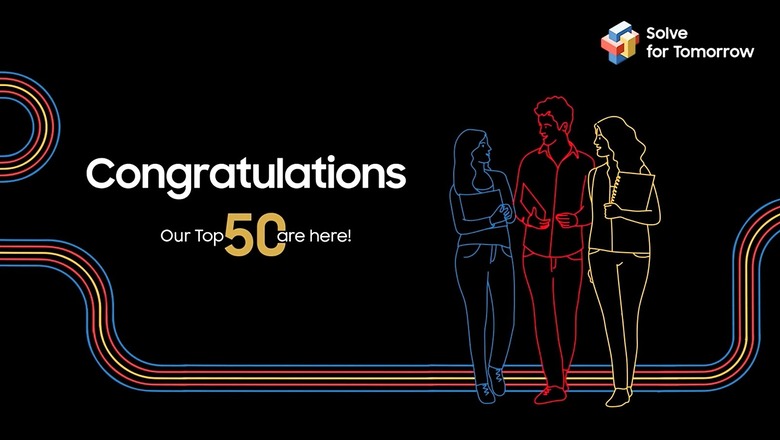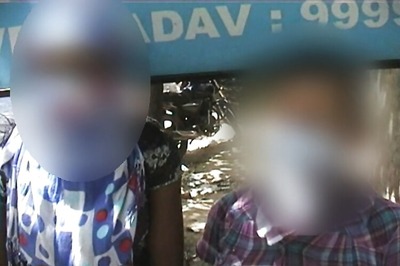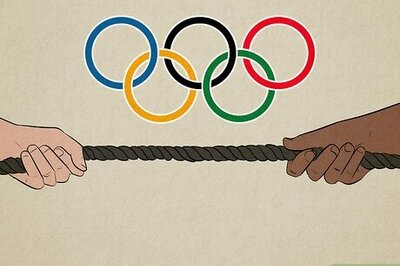
views
India’s changemakers have been wowing the jury at Samsung’s first ever Solve for Tomorrow competition in India! The international competition finally arrived in India this year, and the volume and quality of entries have delighted the jury with their scope and inventiveness.
The competition called for creators/thinkers/tinkerers in the age group of 16-22 to come forward with their ideas for change in 4 key areas: healthcare, environment, education and agriculture. After much deliberation, the jury announced the list of the Top 50 entries, who will now attend a 3-day bootcamp at FIIT-IIT Delhi campus, where they will receive expert advice, guidance and mentoring.
Not surprisingly, 30 of the Top 50 entries were in the healthcare space, and we detailed them here. In this article, we’ll cover the entries in the areas of environment, agriculture and education.
Environment
A number of teams focused on the problem of water purification. Team Planeteers are working on an Underwater Autonomous Vehicle that will have the ability to detect micro and nano plastics (and their concentrations) and filter them out of natural water bodies, while Marine Conservers are designing a self propelled boat that will aid in garbage collection on rivers. Carboxy HITAM are using a novel, nature based approach that introduces Spirulina Algae into pond water, which purifies the pond naturally. MIT2 are thinking about reducing the amount of water we use for washing our hands by using a fog based approach that reduces water wastage by a whopping 95%!
When it comes to power, teams are thinking of ways of producing power, as well as reducing its use. Incy Tech is working on an alternative to solar panels that uses thermal energy from the sun, as opposed to light energy, to generate electricity. Another team is working on a novel solution involving Water Upliftment without using electric pumps, which will be invaluable in places where electric power is limited or sporadic.
Team Benz is thinking about how to simplify managing our forests – by using a GIS based system that matches soil to the trees that are most suited. Team Potty is looking for ways that help human beings relate to plants on a more equal footing, and hence, promote empathy.
Teams are also thinking very seriously about our garbage problem: Team Aero Scientist are designing a system that will remove space debris, while Team Green Ranger’s garbage collection robot will work closer to home – in our rural and urban public spaces. NSS Team is taking an inventive approach to plastic disposal by turning it into strong paper that can be used for packaging, and will be biodegradable!
Agriculture
Food security is going to be one of our biggest challenges in a changing climate. A number of teams are working on automations that can significantly help farmers increase yield, make the most of their resources, and lessen the use of harmful chemicals. Team Tech Phantoms is designing an automatic weed digger system that will enable farmers to reduce dependence on chemical weedicides. Something Interesting is working on an AI enabled drone that will help monitor crops for diseases and weed growth, enabling judicious use of pesticides and weedicides only in affected plants. Pack of Wolves is designing a scarecrow that uses sound frequencies to deter animals, birds and insects from infesting crops.
Project GreenGlobe is working on an autonomous plant watering system that takes into account multiple factors to provide just enough nutrition to plants – minimising waste! Team Agriwheel will help automate irrigation systems and crop disease detection systems, as well as help farmers identify the best crops to grow on their land (and when!). Team Explorer is thinking about the starting point – how do we get good quality seeds to farmers in the first place? Their solution makes the most of existing infrastructure, with a digital twist!
Education
Each of us learns differently – we know this now, and have the research to back it up! Classroom teaching is no longer considered the de facto method of imparting quality education, something that India’s NEP also acknowledges. Team InKRID understands this implicitly, and are hard at work designing games and educational toys that will make play and discovery the core methods of teaching. Team LeVel’s aim is to level the playing field for students by creating a SaaS platform that caters to the learning styles and learning needs of students of all stripes.
The Acharya app on the other hand, looks to solve two problems: unemployment among the educated, and India’s teacher shortage. By connecting these two groups, the app hopes to create synergies that will benefit Tier 2 and Tier 3 students, as well as educated unemployed people across the nation.
Conclusion
If the entries are anything to go by, the Samsung Solve for Tomorrow competition is already achieving its goal of inspiring change. However, these Top 50 entrants have much to look forward to. Once the 3 day bootcamp is over, the list will be filtered down to the Top 10, who will get to work with experts in the Samsung R&D centres, to further refine their ideas and solutions.
There is so much about these solutions that excites us! To keep abreast of the outcomes of this competition, and to watch the progress of these teams and their innovations, head over to https://www.samsung.com/in/solvefortomorrow.
This is a partnered post.
Read the Latest News and Breaking News here




















Comments
0 comment